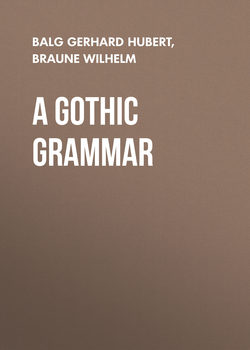Читать книгу A Gothic Grammar - Braune Wilhelm - Страница 6
FONOLOGY
CHAP. II. THE VOWELS
o
Оглавление§ 11. The Gothic character o always denotes a long close o approaching sumwhat the sound of û (= o in E. home).
Note 1. In Greek words o, as a rule, corresponds to ω, rarely to ο; e. g., Makidonja, Μακεδονία; it also stands for ου: Iodas, Ἰούδας; Lu. III, 26.
Note 2. o in Gothic words often stands for (short) u (§ 14, n. 3).
§ 12. ô (= OHG. uo; s. ahd. gr., § 38 et seq.) is frequent in Gothic words. E. g., brôþar, brother; bôka, beech; frôþs, wise; flôdus, flud; fôtus, foot.
In the prt. of the VI. series (§ 35) and of the ê – ô-series (§ 36): ôl, hôf, ôg, pl. ôlum, hôfum, ôgum; laílôt, laílôtum, aísô. In endings, as in nom. pl. gibôs, dagôs; wvs. II.: salbôn; final, in gen. pl. f. gibô, tuggônô; nom. sg. tuggô, haírtô. Prns.: ƕô, þô, sô, ƕanô-h, ainnô-hun, ƕarjanô-h. Verb salbô. Advs. in -ô (§ 211).
Note 1. For ô we sumtimes find u: gakrôtûda (inf. krôtôn), he is crusht; Lu. XX, 18; ûhtêdun (prs. ôg), they feard; Mk. XI, 32. – In East Gothic names u often takes the place of ô; s. Wrede, 'Ostg.', 164.
Note 2. In a few words ô before vowels becums au; s. § 26.
Note 3. ô and u interchange in the inflection of fôn, gen. funins (§ 118). Concerning this and other relations between ô and u, cp. Beitr. 6, 377 et seq.; 564; also Kuhns Zs., 26, 16 et seq.
